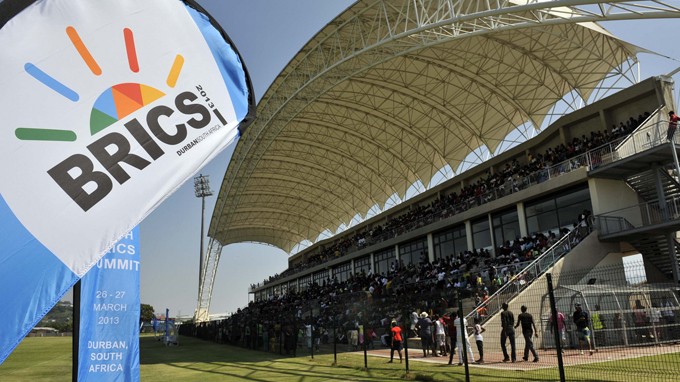(VOVworld) – The fifth summit of the emerging economies, BRICS, opened in South Africa’s port city of Durban on Tuesday. Over the past two years, BRICS members - Brazil, Russia, India, China and South Africa - have led the world in economic growth. But to become a driver of the global economy and play a greater role in today’s challenging world, BRICS needs to increase coordinated efforts towards mutual goals. VOV’s Anh Huyen comments…
 |
| Poster for BRICS summit in South Africa (Photo: brics5.co.za) |
Accounting for nearly half of the world’s population and foreign currency reserve, BRICS’ growth is considered a factor in rekindle the global economic dvelopment. Last year alone, its GDP grew 4% while that of the Group of Seven developed countries was a very modest 0.7%. A recent study by global economic analysts forecast that BRICS will continue to maintain a high growth in the next 15 years.
But BRICS’ economic achievements so far are due to the growth of each member rather than any coordinated action with the main reason being the lack of any joint action plan. The present link between members is one of bilateral relations aimed at maximizing the national interests of each nation. In fact, BRICS countries have differences reflecting the interests of each country, which delay BRICS cooperation. Long standing dissimilarities on a series of issues illustrate the differences like the establishment of a joint development bank and using the US dollar as the world reserve currency. China has long pursued the ambition of turning its currency into a global money of account which can compete with the US dollar and the Euro. Though China has designed a plan to increase loans in Chinese Yuan to other BRICS members, the move is likely to harm more than help the members’ production markets.
BRICS members can’t seem to reach consensus on basic issues. Brazil and Russia hope to benefit it from a rise in the price of energy and raw materials. China and India, two major manufacturers, want the price of energy and raw materials to drop. Brazil, the world’s most competitive agricultural nation, can’t access India’s food consumers because New Delhi has applied strict measures to protect the 300 million people working in its low-competitive agriculture sector.
Internationally, BRICS members don’t share a common view on many issues. China opposed increasing the number of permanent UN Security Council members while India says China should not be Asia’s only representative in this global body.
These obstacles have kept BRICS from reaching its full potential. At this summit, analysts say, there are many signs that BRICS is determined to erase the differences to gain greater achievements. Prior to the meeting, Russian President Vladimir Putin called for changes in a strategic action coordination mechanism for the forum. BRICS leaders have also agreed to set up a new development bank, saying the organization needs a financial tool strong enough to develop trade opportunities and foreign currency reserve links to protect members against global financial shocks. BRICS will issue a joint statement on burning international issues such as the crisis in Syria, Iran’s nuclear program, and denuclearization on the Korean peninsula.
It’s obvious that since it was founded 5 years ago BRICS has contributed to the growth of the global economy but to become an effective counterpoise in world politics and economics, BRICS must prove its determination in actions, not words.
Anh Huyen